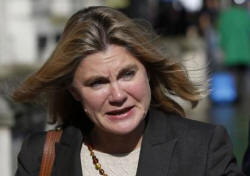|
 UK
to send troops, aircraft and ship to tackle Ebola in Sierra Leone UK
to send troops, aircraft and ship to tackle Ebola in Sierra Leone
 Send a link to a friend
Send a link to a friend
[October 09, 2014]
By William James
LONDON (Reuters) - Britain is sending extra
troops, aircraft and a naval vessel to Sierra Leone to help stem the
spread of the Ebola virus, Defence Secretary Michael Fallon said
following a meeting of the government's emergency response committee.
|
|
 Prime Minster David Cameron chaired a meeting of the committee in an
effort to assuage growing public concern about the spread of the
deadly virus to Europe. Prime Minster David Cameron chaired a meeting of the committee in an
effort to assuage growing public concern about the spread of the
deadly virus to Europe.
Fears have grown since a nurse in Spain became the first person
known to have caught the virus outside Africa and the World Health
Organization warned that Europe was almost certain to see further
cases.
"The Ebola outbreak in West Africa is already a global threat to
public health, and itís vital that the UK remains at the forefront
of responding to the epidemic," Fallon said.
Ebola has killed more than 3,400 people in Guinea, Sierra Leone and
Liberia, and its spread has become a global concern - even hurting
the value of Britain's top share index as the threat of the epidemic
hit airline and tourism shares.[.L]
"Following todayís meeting, we are stepping up significantly the
UKís contribution and leadership in work to tackle the outbreak, on
land, in the air and at sea," Fallon said.

The pledge will see 750 military personnel travel to Sierra Leone
next week to help establish treatment centers and a training
facility. Three helicopters and a 100-bed naval hospital will also
be sent to the region.
Alpha Kanu, Sierra Leone's information minister, welcomed the
pledge, saying Britain had reassured the government during a recent
London donors' conference that it would not abandon the former
colony.
"This is a bold and big step," he told Reuters. "In as much as we
need equipment and money, we also need personnel. It would be good
if most of the 750 were medics."
Around 40 British military personnel, including engineers and
planners, are currently in Sierra Leone overseeing the construction
of a treatment center near capital city Freetown.
Britain had already pledged to send 100 field hospital staff to
Sierra Leone and plans to build at least five treatment centers in
the country with a total of 700 beds.

[to top of second column] |

DOMESTIC RISK
Wednesday's meeting in London of senior ministers and public health
officials was convened to discuss Britain's preparedness in the
event an Ebola case is discovered in Britain.
According to a spokesman from Cameron's office, health officials
told the meeting that the risk to the UK remained low and that
Britain was conducting contingency planning and training hospital,
ambulance and other key health staff on how to handle the disease.
Information posters would be displayed in airports and a nationwide
preparation exercise would be carried out, the spokesman said
without giving further details. Public Health England, the
government body that monitors potential contagions, had on Tuesday
ruled out screening airline passengers.
In the United States, media reports said that travelers arriving
there from Ebola-stricken Liberia, Sierra Leone and Guinea would
face mandatory screening measures for the deadly virus as soon as
this weekend.
Any cases discovered in Britain would be directed to London's Royal
Free Hospital, which has a specialist unit capable of treating two
patients and could expand its capacity if necessary, a health
service spokeswoman said.
(Additional reporting by Umaru Fofana in Freetown; Editing by Larry
King)
[© 2014 Thomson Reuters. All rights
reserved.] Copyright 2014 Reuters. All rights reserved. This material may not be published,
broadcast, rewritten or redistributed.
 |